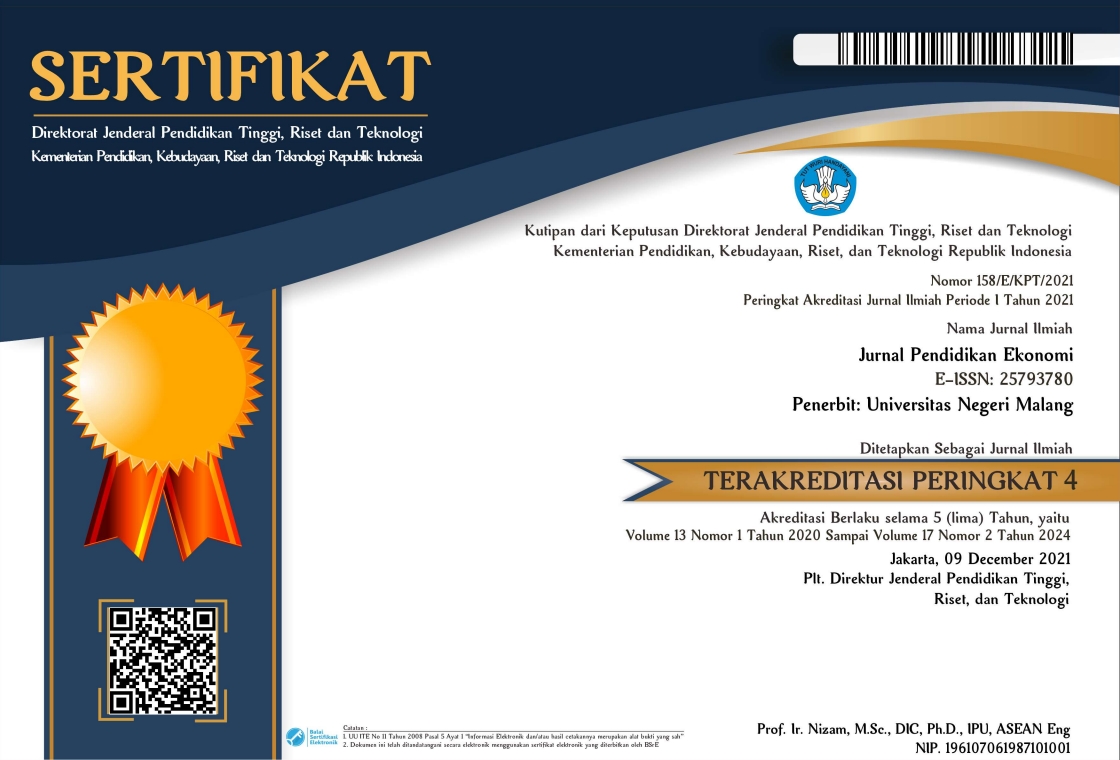Preliminary Development Prince of Macon Game In The Macroeconomic Course
Abstract
The development of learning in Macroeconomics courses is needed to support the improvement of the quality of learning in the economic education study program. With a pleasant learning atmosphere, the learning objectives listed in the curriculum can be achieved. Based on a preliminary study in the form of observations and during the learning process, this course is considered too difficult to understand, because the literature and studies in its discusion come from the translation literature. To understand basic concepts requires high concentration and the need to read repeatedly. So that the resulting evaluation is a low score. This development research is carried out for; presenting learning in macroeconomic courses that are fun and simple to understand, and improve the results of the evaluation in this course. The product specifications produced in this study, namely, the material presented in the product refers to the Development Economics Department curriculum which is in line with the 2018 UM curriculum, the nature of the product is a mobile learning application with android-based learning games. The development model stage in this research (Research and Development / RD) consists of; 1) research and information collecting, 2) planning, 3) develop preliminary form of product. The purpose of further research is learning media for macroeconomic subjects based on educational games called the Prince of Macon Game (Principles of Macroeconomics Game).
DOI: https://dx.doi.org/10.17977/UM014v13i22020p145
Keywords
Full Text:
PDFReferences
Anonim (2013). Criticism and Theory on Game Based Learning. Retrived from https://blogs.ubc.ca/gamebasedlearning/theory-and-criticism/
Anonim (2020). The Theory of Game Besed Learning. Retived from https://www.game-learn.com/the-theory-of-game-based-learning/
Becker, K (2005, June) How Are Game Educational? Learning Theories Embodied in Games. Proceedings of DiGRA 2005 Conference: Changing Views – Worlds in Play. Canada: Suzanne de Castell, Jennifer Jenson
Google Trend (2020). Educational Games, search term. Interest over time. (https://trends.google.com/trends/explore?q=educational%20game&geo=US)
Gall, M. D, and Borg, Waler R. (2003). Educational Research: An Introduction, 7th Edition. New York: Pearson Education
Léger, A dan Swaminathan, S (2007). Innovation Theories: Relevance and Implications for Developing Country Innovation. Berlin: German Institute for Economic Research
Pol, Eduardo (2012). Innovation and Economic Education: An Integration. Journal of Economics and Economic Education Research, vol. 14, pp. 21-36. (https://www.researchgate.net/publication/285524193)
Sandberg, Karl W. (2011). Learning in Innovation Development. Procedia - Social and Behavioral Sciences, vol. 28, pp. 379 – 383. World Conference on Educational Technology Researches – 2011. Amsterdam: Elsevier
Warsita, B (2008). Teori Belajar Robert. M. Gagne dan Implikasinya Pada Pentingnya Pusar Sumber Belajar. Jurnal Teknologi Pendidikan, vol. 12 (1), pp. 64-78. Tangerang Selatan: Redaksi Jrnal Teknodik
Yuberti (2014). Penelitian dan Pengembangan yang belum Diminati dan Perspektifnya. Jurnal Ilmiah Pendidikan Fisika Al-Biruni, vol. 3 (2), pp. 1-15. Physics Education Department, UIN Raden Intan Lampung
Zirawaga, Victor.S (2017). Gaming in Education: Using Games as a Support Tool to Teach History. Journal of Education and Practice, vol.8 (15), pp 55-64. www.iiste.org
Refbacks
- There are currently no refbacks.

Jurnal Penddidikan Ekonomi is licensed under a Creative Commons Attribution-NonCommercial-ShareAlike 4.0 International License





